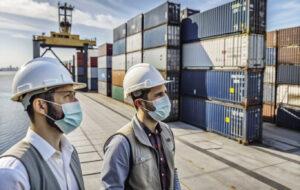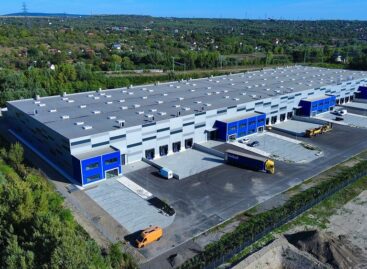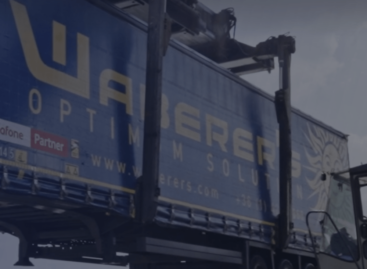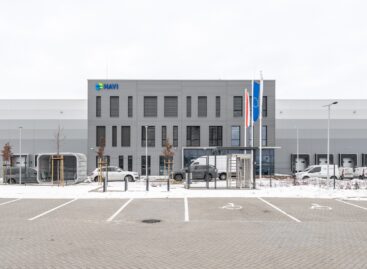Freight forwarding on a fast track
Freight forwarding is at the heart of the FMCG industry and a key driver of the global economy.
This article is available for reading in Trade magazin 2024/8-9

Zoltán Üveges
head of sales and marketing
Raben Trans
Zoltán Üveges, head of sales and marketing at Raben Trans European Hungary Kft. points out that many areas of the economy started 2024 with stagnation or decline.
“Domestic consumption was still affected by last year’s high inflation at the beginning of the year, and this was also reflected in e-commerce indicators, so domestic delivery volumes remained low”,
says the head of sales and marketing.
Expanding range
In Dunaharaszti Raben Group operates a multi-user logistics centre optimised for companies in the FMCG sector, divided into three different temperature zones and offering traditional warehouse logistics for both the food and non-food segments. The centre also provides value-added services such as packaging, labelling, sealing and excise handling. In addition to these, it can provide food companies with a full range of domestic distribution services, in a transparent, audited system and with a dedicated fleet of vehicles. The myRaben self-service platform is the flagship of digital solutions at Raben Group. Registered customers can place orders throughout Europe, track the status of their shipments, access all documents and manage customer service issues. One of the most significant modules is myOffer, from which an automatic offer can be sent within 2-3 minutes.

Tamás Horváth
head of the food logistics division
Liegl & Dachser
“A significant change in international transport is the introduction of the RO e-Transport system in Romania from this year, which allows the tracking of goods over 500kg that are transported by road. This means extra administrative work for logistics managers”,
says Tamás Horváth, head of the food logistics division at DACHSER Hungary Kft.
The DACHSER network covers the whole world. They offer a comprehensive service in two areas: Dachser Air & Sea Logistics and Dachser Road Logistics – both of them provide tailored-made services. DACHSER is a founding member of the European Food Network, which offers temperature-controlled deliveries to 34 countries through a network of partners throughout Europe.
A series of challenges
At the beginning of 2024 road tolls increased significantly in Hungary and several European countries, plus fuel prices have also been on the rise. Fleet maintenance costs are growing as well, and it isn’t always possible to reflect these trends in the price of services. More and more strict environmental regulations and sustainability requirements are forcing transport companies to pay special attention to cutting emissions and increasing sustainability when selecting and employing subcontractors.

Nikoletta Kiss
CEO and owner
Palmsped
“In the first period of 2024 there was no noticeable increase in the volume of transport orders, but in the second quarter – mainly in the FMCG sector – the need for capacity increased, albeit on a project basis, owing to the switch to DRS”,
points out Nikoletta Kiss, CEO and owner of Palmsped Cargo Kft.
Palmsped supports its customers already in the preparatory phase of market entry with freight calculations, route plans, transit time forecasts and economic solution proposals.
Beyond the basics
Service providers have had to recognise changing consumer needs, which have manifested in the expansion of e-commerce, increasing the number of B2C deliveries that require faster and more flexible processes. The issue of flexibility and transparency has also become more important.

Gabriella Szécsi
managing director
BI-KA Logisztika
“The growing demand for oversized deliveries is clearly indicated by the fact that in the first half of 2024 the number of our tasks in this area exceeded the level of the same period in 2023 by more than 50%”,
reveals Gabriella Szécsi, managing director of BI-KA Logisztika Kft.
The company also sees increased interest in intermodality. Annual sales are at HUF 15bn and the firm has 250 employees. Their most popular service is international road transport, followed by international road haulage – performed with their own equipment. BI-KA Logisztika Kft. also provides domestic freight forwarding and haulage services, mainly for automotive and agricultural machinery manufacturers, and they also have warehouse logistics services, operating from Szolnok and Dunaharaszti on 40,000m². //
Boats on green waves
Innovations in the inland waterway sector are helping to reduce the carbon footprint of the logistics industry, particularly in the food industry. Using waterways can reduce emissions by up to 40% compared to road transport. New developments include hybrid and fully electric cargo vessels. Biofuels and hydrogen are also important factors in the greening of waterways. French navigation authority VNF has successfully conducted trials with hydrogen-powered cargo ships that emit only water vapour. //
Hungary joins the e-CMR convention
Hungary’s government has officially declared its intention to join to the international convention on electronic consignment note. Hungarian logistics service providers, freight forwarders and road hauliers welcome the decision to introduce e-CMR in Hungary. Using e-CMR speeds up and simplifies transport processes, reduces costs, increases efficiency and makes logistics greener. The digital consignment note facilitates the tracking of shipments and managing documents in a fast, secure and reliable way. Introducing e-CMR will have a positive impact on the development and competitiveness of the logistics sector. Hungarian-owned e-CMR Europe Kft. is eagerly waiting for the ratification of e-CMR in Hungary. Their mission is to introduce domestic and international electronic consignment notes as quickly and smoothly as possible. //
International trade on the verge of a crisis once again
Following the recovery from the coronavirus pandemic, international trade is now facing another crisis: a massive containers shortage caused by the Red Sea conflict, which is reaching dramatic proportions. In the middle of the peak shipping season operators are struggling with high tariffs, growing delivery times and capacity shortages.

In the middle of the peak season for shipping, international traders face high tariffs, increasing delivery times and capacity shortages
Attila Mihály, an expert of Trans-Sped told: during the post-Covid container shortage prices augmented dramatically and now they are once again back at USD 10,000-11,000, while there is also a container shortage in China. The biggest problem is the detour in Africa, which results in containers being on the road 2-3 weeks longer, with global freighter capacity down 20%. Market players are looking for new sources of supply and more cost-effective modes of transport. They are moving towards stockpiling and warehousing, as the increase in transport fees is also driving up the inflation rate. //
Related news
The domestic logistics market has been expanded with a unique cold storage facility: the new headquarters of HAVI Logistics have been opened
🎧 Hallgasd a cikket: Lejátszás Szünet Folytatás Leállítás Nyelv: Auto…
Read more >Related news
40 secure jobs, sustainable solutions – new BURGER KING® in Csepel
🎧 Hallgasd a cikket: Lejátszás Szünet Folytatás Leállítás Nyelv: Auto…
Read more >Hétéves növekedési stratégiát jelentett be az Auchan
🎧 Hallgasd a cikket: Lejátszás Szünet Folytatás Leállítás Nyelv: Auto…
Read more >








